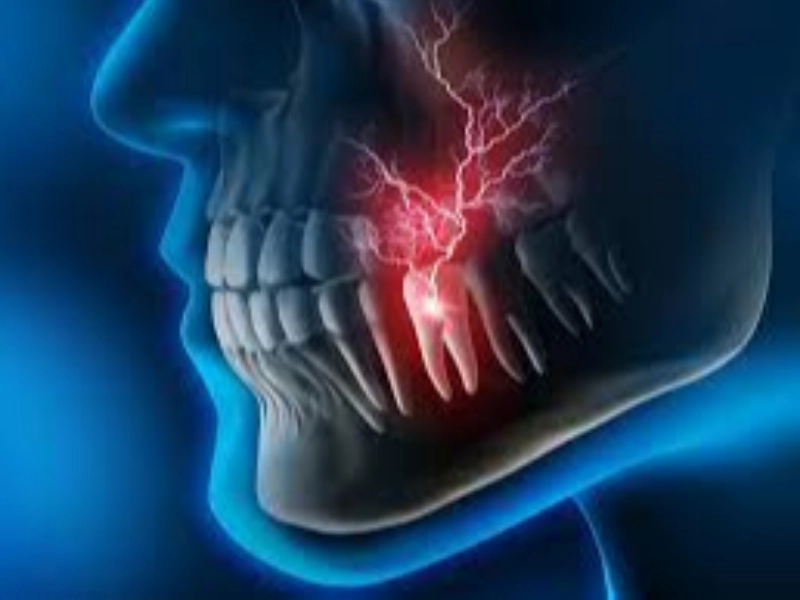You may have a dying or dead tooth nerve if you are feeling a sharp pain in your teeth that won't go away. This is a dental issue that has to be treated right away.
It is untrue for some people to think that they will no longer experience pain after a tooth nerve dies. Periodontal membranes, which are nerve endings on the outside of the tooth, are typically the source of pain when a tooth is dead.

The pulp of your tooth, which is a collection of blood vessels and nerves, is often the source of pain. Your tooth pulp may be infected if you experience a constant, intense ache that is either uncomfortable or brought on by hot or cold meals or beverages. If left untreated, this can result in the loss of teeth and bones. Another sign that the pulp is dying could be the ache.
To receive the right care, you should always see your dentist, regardless of whether the pain is subtle, throbbing, or acute. By doing this, you can be sure that the root of the problem is treated and that your tooth can be preserved. In addition, pain can be reduced with over-the-counter medications.
The best over-the-counter analgesics for toothache are ibuprofen and acetaminophen together. This drug offers immediate pain relief and may aid in oedema reduction. A cold compress can also be applied to the affected area to numb it and reduce swelling and pain. Last but not least, grinding your teeth might hurt like a toothache and radiate to the joints and bones of your jaw.

Due to the heightened sensitivity of tooth nerves compared to other parts of the body, any sharp or dull discomfort indicates a problem. You should schedule an appointment with a dentist if a toothache persists for more than a day. The issue could worsen and cause further issues, such as a dental abscess or an infection in the sinuses or jaw, the longer you leave it untreated.
A painful, throbbing feeling and sensitivity to heat or cold are signs of an infected tooth. Pain may also be experienced during brushing or chewing. A toothache can occasionally be so severe that it causes swelling on the affected side of the jaw and radiates to the surrounding gums.
A toothache can be relieved at home until you visit the dentist. To eliminate bacteria and lessen discomfort, you can rinse your mouth with a solution made of warm water and salt. Take a glass of warm water, dissolve half a teaspoon of salt in it, swish it about your mouth for a minute, and then spit it out—do not swallow it. Rinse again as often as possible.

The source of a toothache determines how to treat it, and only a dentist can determine this. The dentist may fill the hole, extract the infected portion of the tooth, or do a root canal if the pain is brought on by a huge cavity, broken tooth, or infected nerve. If bacteria are the cause of the infection, antibiotics may be recommended to treat it.
Acetaminophen and ibuprofen are two over-the-counter pain relievers that can be used to lessen the severity of pain. It is preferable to treat infected teeth as soon as possible in order to prevent more serious issues.
It is essential to see a dentist right away if the discomfort is accompanied by fever, swollen gums, discharge from the mouth that tastes bad, or swelling of the jaw or ear on the side of the face. In addition to performing a physical examination and X-ray examination, the dentist will prescribe dental procedures as necessary. The application of cold therapy, such as ice packs or frozen pea bags, can narrow blood vessels and cause localised numbness. To relieve discomfort and eradicate bacteria, use a few drops of peppermint essential oil on a cotton ball and press it against the affected area, if one is available.

As soon as you feel tooth pain, you should make an appointment with a dentist. Your tooth's nerve could perish if you ignore the issue. Numerous issues will result from this, such as lost jaw bones, inflamed gums, and more.
The pulp will starve the nerve when pressure inside it increases and cuts off its blood supply. This is the main cause of the symptom, which is pain.
The majority of tooth-nail dying can be avoided by maintaining proper oral hygiene and scheduling routine cleanings with your dentist. Along with avoiding hard, crunchy meals, you should use toothpaste designed specifically for sensitive teeth.
It's also vital to remember that a sudden cessation of dental pain could indicate the death of the nerve. It's difficult to ignore the nasty, salty taste and smell of necrotic tissues. In order to prevent the infection from spreading to your other teeth and jaw bone, you should treat a dying or dead tooth as soon as possible.